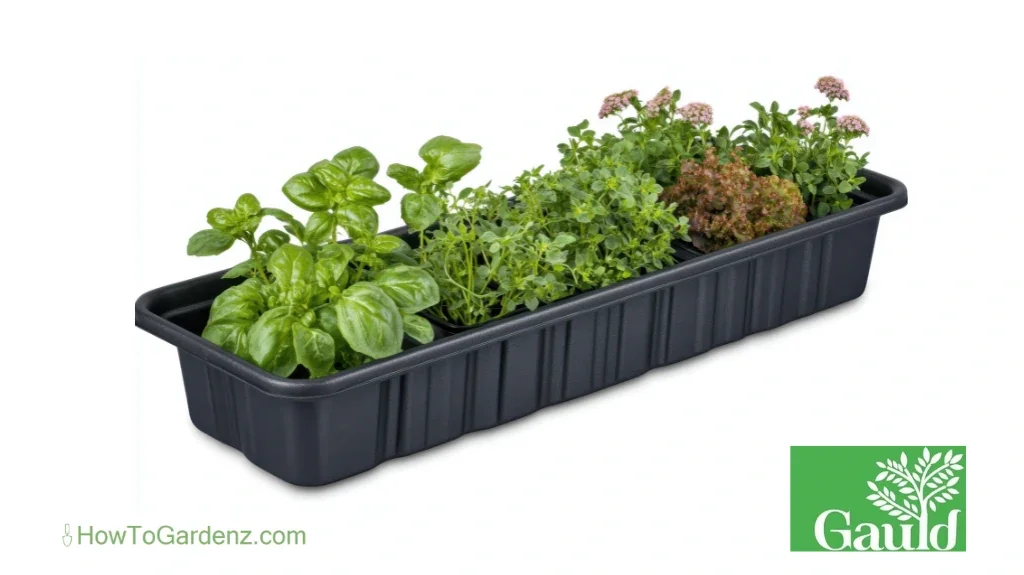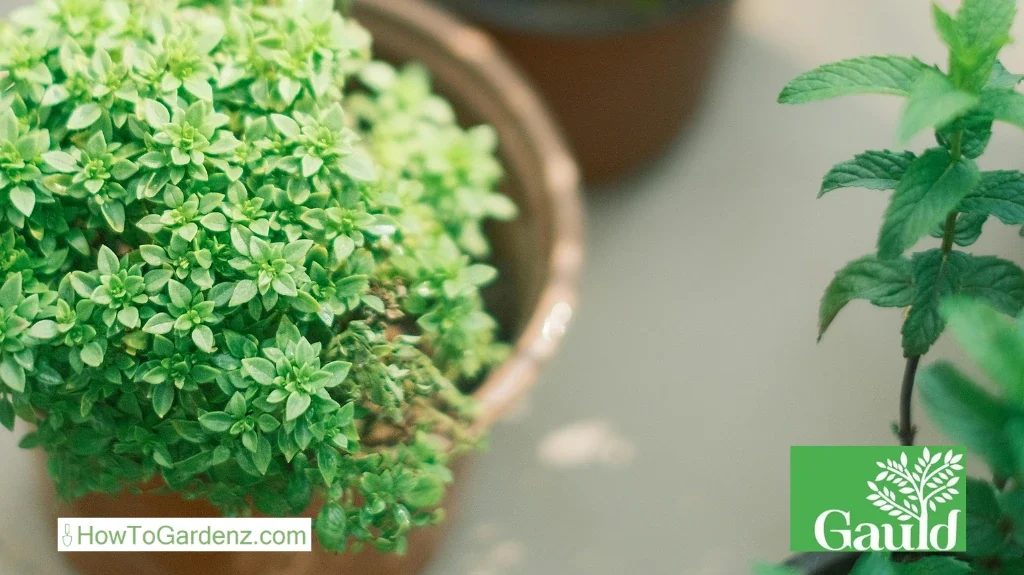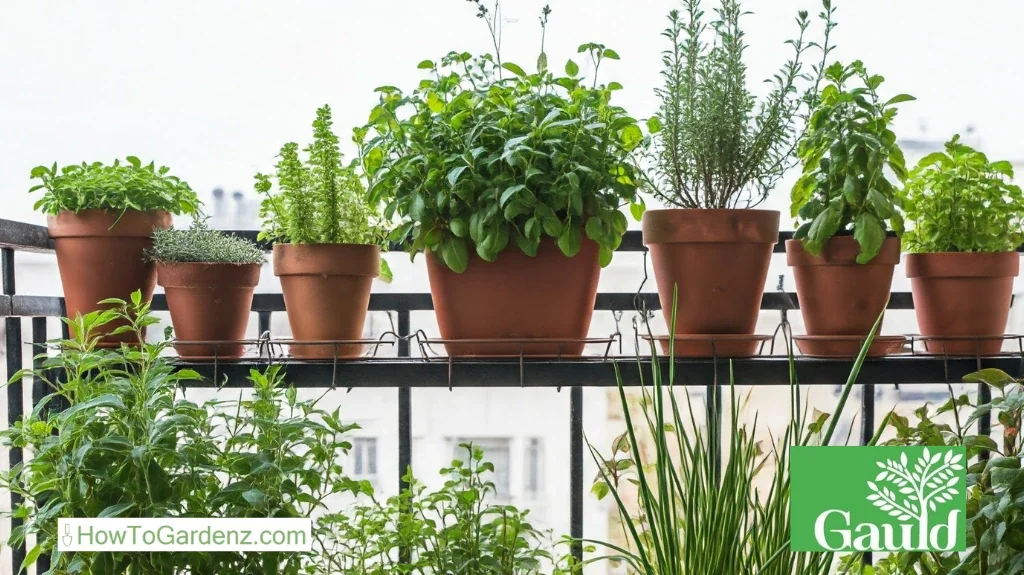How to Grow an Herb Garden on Your Balcony
Image by Cristina Ferrigno from Pixabay
If you’ve ever wondered how to grow an herb garden on your balcony, the good news is it’s easier than you think. With just a few pots, the right sunlight, and some beginner-friendly herbs, you can turn even the smallest outdoor space into a fresh supply of flavour for your kitchen.
Whether you’re starting from seeds or picking up ready-to-grow seedlings from a trusted garden centre like Gauld Nurseries, balcony herb gardening is a simple and rewarding way to enjoy homegrown taste all season long.
Make your balcony garden a reality. Visit Gauld Nurseries to pick up easy-to-grow herb seedlings and starter kits today.
Key Takeaways
Proper containers with drainage are essential for healthy balcony herbs.
Most herbs need at least 6 hours of sunlight daily, but shade-tolerant options are available for less sunny balconies.
Both seeds and seedlings have benefits; seedlings offer a faster harvest, while seeds allow for greater variety.
Compact herbs like basil, thyme, mint, parsley, and chives thrive in small spaces.
Use well-draining soil, add compost, and space plants appropriately for strong, productive growth.
Consistent watering, pruning, and pest monitoring are key to maintaining healthy herbs.
Harvest herbs regularly, pinching or cutting above leaf nodes, to encourage new growth and maximize flavour.
Creative solutions like vertical planters, railing containers, and companion planting help make the most of limited balcony space.
Starting with Gauld Nurseries’ starter kits or herb seedlings makes growing a balcony herb garden simple and successful.
How to Grow an Herb Garden on Your Balcony
1. Choosing the Right Pots and Containers
Choosing the right containers is maybe the single most important aspect in having a successful balcony herb garden. Good pots not only keep your herbs healthy, but they also make the most of space.
Before planting, consider the following key factors:
Provide for drainage. Ensure the pots have holes so water will not collect at the bottom, resulting in root rot or other problems with your plant.
Choose light pots. To make it easy and convenient to move around on your balcony, use plastic or light resin pots rather than heavy clay or ceramic pots.
Consider railing planters. Railing planters are great for small balconies because they hang outside of the railing, keeping floor space clear but still getting sunlight.
Try out vertical herb towers. Vertical planters or stacked planters make it possible to fit more herbs in a smaller space by letting plants stack vertically.
Clay vs. plastic or ceramic. Clay pots are lovely and light, but dry out faster and are heavy. Plastic or ceramic pots retain moisture longer and are easier to transport.
Max out your space. Take advantage of shelves, hanging baskets, or wall planters to create more growing space without clustering the balcony floor.
By choosing your pots and containers wisely, you can successfully grow your herbs and make the best of your balcony space. The size, material, and type of container are what decide the foundation of a successful and attractive herb garden.
Explore Gauld Nurseries’ wide selection of pots, perfect for creating a beautiful and productive herb garden on your balcony.
2. Sunlight Requirements for Balcony Herbs
Sunlight is the most important factor for healthy herb development. Most herbs need a lot of light to thrive, so it's important to know what sun access your balcony receives.
Some things to keep in mind when planning your balcony herb garden include the following:
Target 6+ hours of sunlight per day. Basil, thyme, sage, and rosemary are just a few of the many herbs that need at least six hours of direct sunlight every day to thrive and taste great.
Adapt to shaded areas. If your balcony is partially shaded, choose herbs that tolerate less light, such as mint, parsley, chives, or cilantro.
Use portable pots. Place herbs in pots which are movable to relocate around as the sun moves throughout the day, especially if your balcony has sections with mixed light and shade.
Reflected light surfaces can come in handy. White walls or mirrors can be used to reflect sunlight on your herbs, providing a little more light to the herbs in less illuminated spaces.
Watch out for heat and glare. On very hot balconies, provide some afternoon shade or utilize a sheer curtain to prevent herbs from drying or wilting.
By matching your herbs to the light conditions on your balcony, you’ll ensure they stay healthy and productive. Proper sunlight exposure is the key to vibrant, flavourful herbs that flourish in small spaces.
3. Seeds vs. Seedlings: Which Should You Choose?
When planting a balcony herb garden, the decision between seeds and seedlings can make a tremendous impact on how rapidly your garden grows. Both seedlings and seeds carry special advantages based on what you want to accomplish and how much experience you have.
Use these factors when making your selection:
Seeding from seeds. Planting herbs from seeds is cheap and offers variety. It also allows you to take charge of the whole growing cycle from sprout to harvest.
Starting with seedlings. Herb seedlings give a head start, providing harvestable leaves in less time than seeds. They suit beginners or those unwilling to wait.
Combining both techniques. Seeds and seedlings can be combined in your balcony garden to have both variety and rapid growth.
Convenience of ready-to-grow plants. Herb seedlings found in many garden centres, including Gauld Nurseries, save time and reduce guessing.
Consider your space. Seedlings transplant better into small pots, while seeds require constant monitoring and frequent watering when germinating.
Choosing seeds or seedlings is dependent on your time, experience, and how quickly you want to have fresh herbs. Either approach can lead to a successful balcony herb garden with proper care and planning.
4. Best Herbs for Small-Space Gardening
| Herb | Sunlight | Water Needs | Growth Habit |
|---|---|---|---|
| Basil | Full sun | Moderate | Bushy |
| Thyme | Full sun | Low | Compact |
| Mint | Partial sun | High | Spreading |
| Parsley | Partial sun | Moderate | Upright |
| Chives | Partial sun | Moderate | Clumping |
Not all herbs are created equal when it comes to balcony gardening. Choosing compact, easy-to-grow varieties ensures you get the most out of limited space while still enjoying fresh flavours.
Here are some of the best herbs for small spaces:
Basil. Basil thrives in sunny spots and grows well in containers. Regular harvesting encourages bushier growth and more flavourful leaves.
Thyme. Thyme is a low-maintenance herb that stays compact, making it perfect for small pots or tiered planters.
Mint. Mint is extremely fast-growing and hardy. It is best kept in its own pot to prevent it from spreading into other plants.
Parsley. Parsley tolerates partial sun and grows well in medium-sized containers. Regular cutting keeps the plant productive.
Chives. Chives are excellent for balcony gardens with partial sun. Their mild onion flavour works well in many dishes.
Tips for mixing herbs. Group herbs with similar sunlight and water needs in the same container to simplify care and maximize space.
By selecting the right herbs, you can enjoy a productive and flavourful balcony garden without overcrowding your space. Focus on varieties suited to containers, and you’ll have a thriving herb garden no matter the size of your balcony.
5. Planting Tips for Balcony Herb Gardens
Proper planting sets the stage for a healthy and productive herb garden. With the right soil, spacing, and planting techniques, even small balconies can be home to lush herbs.
Keep the following in mind when planting your balcony herbs:
Use the right soil. Choose a light, well-draining potting soil that's designed for container gardening. Avoid using garden soil, which will compact and prevent root development.
Add organic fertilizer or compost. Adding compost to the soil gives the herbs the necessary nutrients and makes them strong and full of flavour.
Spacing. Provide adequate space for each herb to grow. This prevents overcrowding, which causes plants to compete for nutrients and water, thereby lowering overall production.
Planting depth. Plant seedlings at the same level they were in the pot to prevent stress.
Container size. Select pots that are large enough to accommodate mature plants; small pots may dry out too quickly and limit growth.
By paying attention to soil quality, spacing, and container size, you’ll give your balcony herbs the best start possible. Proper planting ensures healthy roots, strong growth, and a more productive harvest throughout the season.
6. Watering and Care
Proper watering and regular care are essential for keeping your balcony herbs healthy and productive. Even small containers can dry out quickly, so it’s important to develop a consistent routine.
Consider these tips for watering and caring for your herbs:
Check soil moisture regularly. Stick your finger about an inch into the soil. If it feels dry, it’s time to water. Avoid overwatering, which can lead to root rot.
Water thoroughly. Ensure water reaches the bottom of the pot so roots grow deep and strong. Shallow watering encourages weak, surface roots.
Use saucers or trays. Place pots on trays to catch excess water and prevent balcony messes, but avoid letting water sit for too long.
Prune regularly. Pinching back herbs encourages bushier growth and prevents plants from becoming leggy or overgrown.
Monitor for pests. Keep an eye out for common pests like aphids or spider mites, and address issues promptly to protect your plants.
Rotate pots if needed. Turn containers occasionally to ensure all sides of the plant receive sunlight evenly.
By following a consistent watering and care routine, your balcony herbs will stay healthy, flavourful, and productive all season long. Proper maintenance makes growing an herb garden both easy and rewarding.
7. Harvesting Herbs for Fresh Flavour
Knowing when and how to harvest your herbs is the key to getting maximum flavour and keeping your plants productive. Regular harvesting also encourages new growth, so your balcony garden will be more productive.
Keep the following in mind when harvesting:
Harvest in the morning. Herbs are most effectively harvested after morning dew has dried but before the day's heat, when essential oils are most concentrated.
Pinch or cut accordingly. Pinch off leaves or cut stems just above a leaf node with scissors or fingers to encourage bushier growth.
Don't harvest more than one-third. Never harvest too much from a single plant at one time, because this stresses the herb and reduces potential future growth.
Growth is stimulated by regular harvesting. Regular light harvesting encourages plants to continue producing new leaves throughout the season.
Use right away or preserve. Fresh herbs can be used right away in cooking or preserved through drying or freezing for later use.
By harvesting thoughtfully, you’ll enjoy flavourful herbs while keeping your balcony garden healthy and productive. With consistent care, your plants can provide fresh herbs all season long.
8. Balcony-Friendly Herb Gardening Extras
Even small balconies can become lush, productive herb gardens with a few creative strategies. These extra tips help you make the most of your space while keeping your herbs healthy.
Consider these ideas for balcony-friendly gardening:
Vertical gardening. Use wall-mounted planters, hanging baskets, or tiered containers to grow more herbs without taking up valuable floor space.
Companion planting. Pair herbs with compatible plants. For example, basil grows well near tomatoes and can help improve their flavour.
Seasonal care. Move pots indoors or to a protected area during cooler months to extend the growing season and protect sensitive herbs.
Creative container placement. Use shelves, railings, and corners to maximize growing space while keeping your balcony organized.
Regular maintenance. Continue pruning, watering, and monitoring for pests to keep your herbs thriving throughout the season.
With these extras, your balcony garden can be both productive and visually appealing. Small spaces don’t have to limit your herb-growing potential. Creative solutions make it easy to enjoy fresh herbs all year long.
Start Your Balcony Herb Garden Today with Gauld Nurseries.
Growing an herb garden on your balcony is both fun and rewarding, even in small spaces. By choosing the right containers, providing adequate sunlight, selecting herbs suited for your space, and following proper planting, watering, and harvesting techniques, you can enjoy fresh, flavourful herbs right at your fingertips.
Whether you’re a beginner or an experienced gardener, starting small and gradually expanding your balcony garden is the key to success. For an easy start, Gauld Nurseries offers starter kits and herb seedlings that are perfect for balconies and patios, taking the guesswork out of growing your own herbs. They also have a wide selection of beautiful pots that will not only be the perfect vessels for your herb garden but will also enhance to look of your balcony.
Visit Gauld Nurseries today and bring your balcony herb garden to life with fresh, healthy plants that will enhance your cooking and brighten your outdoor space.
What Gauld Nurseries’ Customers Are Saying…
“We went to Gauld Nurseries today feeling overwhelmed due to our limited knowledge of flowers and the planting process.
When we arrived we were greeted with a friendly smile from Joanne, who was eager to help us in the design and selection process for the flowers to fit in our backyard space. She is very knowledgeable and passionate about the work she does that she made our visit an enjoyable one and less stressful. Thank you for being patient with us.
These newbies will be back!”
— M T
Get Growing with How to Gardenz
Connect with our gardening experts at HowToGardenz! We provide tips, tools, and reviews to help you develop your green thumb while embracing sustainable and low-maintenance gardening practices. Learn how to grow a thriving garden that’s both eco-friendly and easy to care for!
Have gardening expertise to share? Or a thriving greenhouse to showcase? Join HowToGardenz! List your products or services and connect with other plant enthusiasts who are passionate about creating sustainable, beautiful gardens. Let's spread the joy of growing together, with less effort and more impact!








